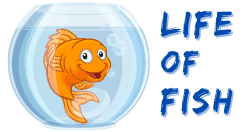Yes, guppies eat plants and algae for their survival. They are omnivorous species which means, they eat plants as well as meat.
These species are opportunistic feeders who spend a lot of time searching for food that they can eat. Their feeding habits depend widely on the living environment that they are in.
Guppy can be a great addition to your aquarium as a cleanup crew because of this. It is hard to balance a proper diet for the guppy.
Anyways the average tropical fish diet where most people use is perfect for guppies. Always remember that lack of feeding for these fish can lead them to go and eat your aquarium’s plantation.
Why Are My Guppies Eating My Plants?
Jump To
- 1 Why Are My Guppies Eating My Plants?
- 2 Is Algae Good For Guppies?
- 3 Do Guppies Eat Hair Algae?
- 4 Do Guppies Eat Plant Roots?
- 5 Do Guppies Eat Brown Algae?
- 6 How Do I Keep Guppies From Eating My Plants?
- 7 What Do Guppies Eat In The Wild
- 8 What To Feed Guppy In An Aquarium
- 9 Feeding Frequency Of Guppies
- 10 Do Guppies Eat Algae Wafers?
- 11 Do Guppies Like Planted Aquariums?
- 12 How long can guppies stay without food?
- 13 Can I feed guppies vegetables?
- 14 Can guppies eat bread?
- 15 What can you feed your guppies if you run out of food?
- 16 Related Questions
- 17 Conclusion
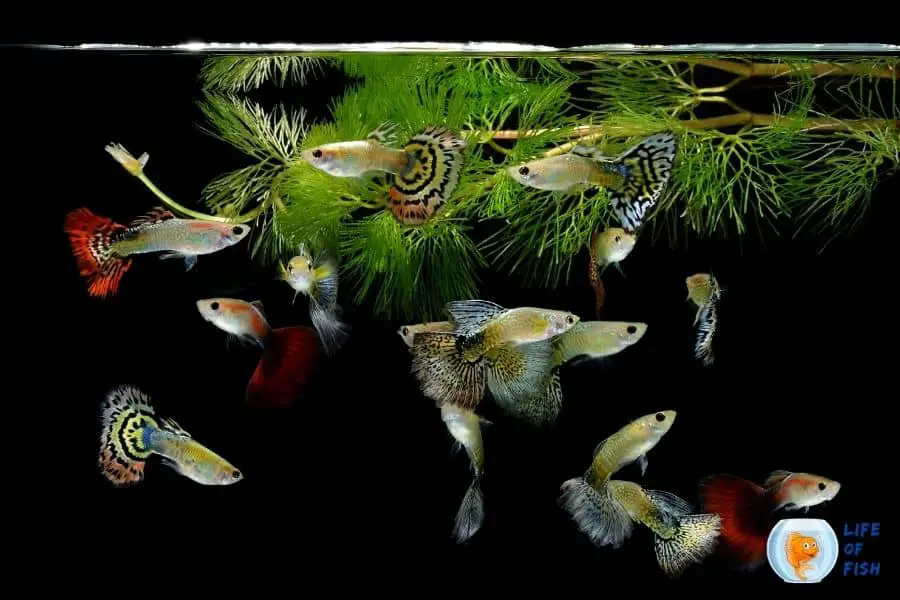
Guppies typically pick algae off plant leaves. If there are no algae and they do not get sufficient plant matter from their diet, guppies will eat plants.
If guppies eat plants, you can put plant-based fish food, which is goldfish food, or veggie flake, and increase the light source in the tank for the algae to grow.
Using these methods, you can divert them from eating plants.
Is Algae Good For Guppies?
Yes, Algae is one of the essential sources of protein and nutrients.
Guppies’ main feeding source in the wild is plant matter. They will also eat algae that grow naturally in the fish tank.
Algae grow considerably faster than guppies eat them. Always consider that too many algae could extract nutrients and oxygen from the water. Therefore you should be weeding most of the time.
If you do not find enough algae to feed your guppies, you can always go for an alternative option like an algae wafer.
Do Guppies Eat Hair Algae?
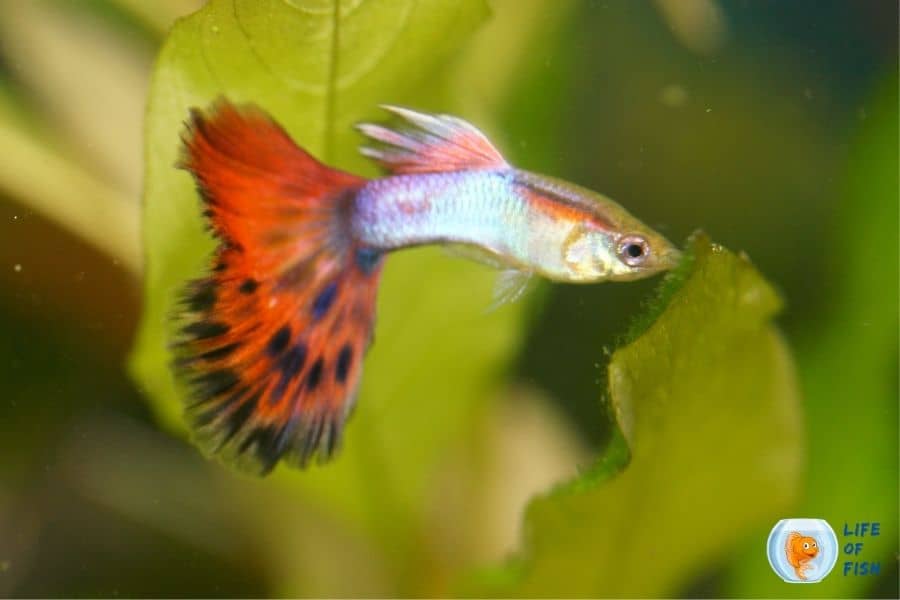
Yes, guppies do eat hair algae. However, these types of plants are mainly growing if there is a nutrient imbalance in your tank.
Do Guppies Eat Plant Roots?
Yes, guppies do eat aquarium plant roots when underfed. However, it is unlikely they eat plant roots when leaves and other parts of the plants still remain.
Do Guppies Eat Brown Algae?
Yes, guppies do eat brown algae.
These plants can be seen even in a well-maintained tank. However, most of the owners prefer feeding their fish with brown algae as an alternative solution.
How Do I Keep Guppies From Eating My Plants?
Guppies eating plants can be a nightmare for a person who loves aquatic plants. These fish start to eat your tank plantation when they do not get enough plant-based food.
So, it would help if you feed your fish with enough plant-based food such as algae wafers, peas, or cucumbers.
Doing so will ensure that guppies will not nibble the aquarium plantation.
What Do Guppies Eat In The Wild
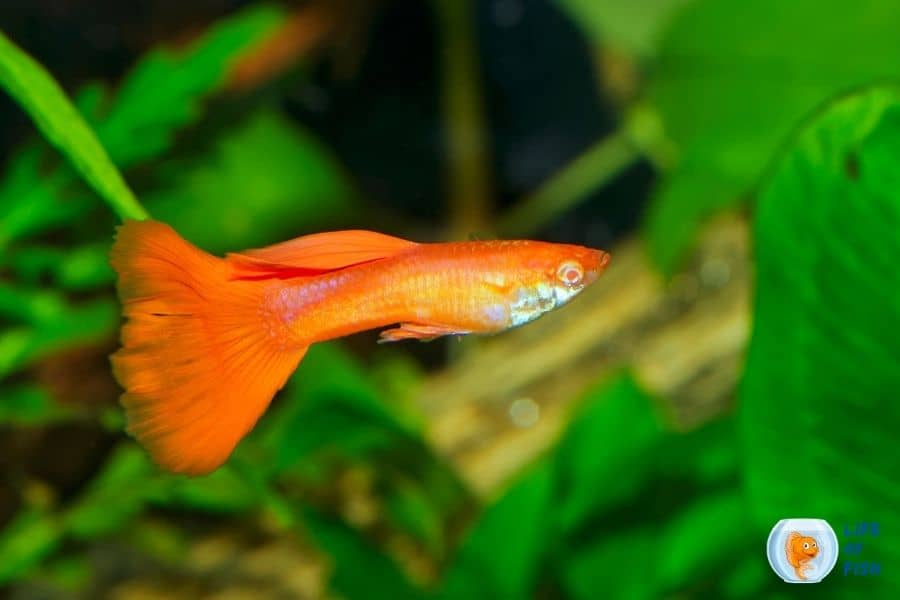
Wild guppies’ diets may depend on a few specific conditions of the food availability in the habitat. Below are some of the names of food where the guppies feed in the wild.
Algal Remains.
These are a diverse group of aquatic organisms that can conduct photosynthesis.
Diatoms.
These are single-celled photosynthetic organisms. They produce their food the same way a plant does.
These organisms fall under the algae group and form one of the most common forms of phytoplankton, which joins the countless numbers of organisms that drift on the ocean current.
Invertebrates.
A cold-blooded animal without back-borns. For example, squids. Claims and coral.
Plant fragments.
Plant fragments are a common type of vegetation reproduction in a plant.
Mineral Partials.
Natural inorganic solid.
Aquatic Insect Larva.
These are underwater insects. These larvas look quite different from their adult forms and have gills to help them breathe.
And other sources, where algal remains constitute the most significant proportion of a wild guppy’s diet.
What To Feed Guppy In An Aquarium
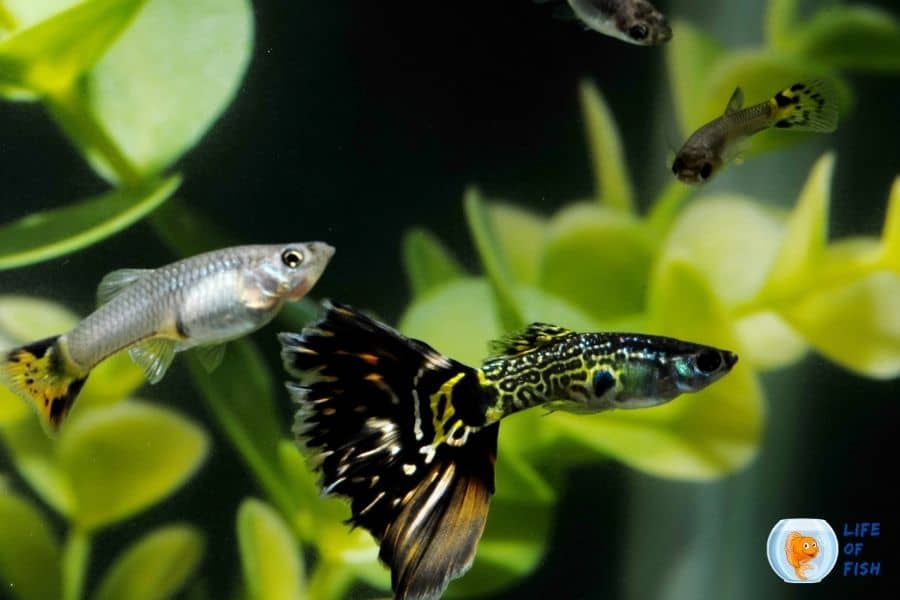
Guppies are not picky eaters and even graze on algae buildup inside the tank. They usually eat bloodworms, brine shrimp, flake food, pellets, fry, and little fish food.
Guppies are omnivores and require both algae-based foods as well as meaty food. Guppy fry, unlike other baby fish, will accept any food that their adult parents eat.
Ensure that you crush the food before you feed the guppy fry. The best recommended live food to provide your fish are live baby brine shrimp, micro worms, daphnia, or vinegar eels.
Many researchers have confirmed that guppies show diet-switching behavior. In addition, the result shows that different groups of guppies have weak and variable food preferences.
Feeding Frequency Of Guppies
Mature Guppies
You can feed the adult guppies once or twice a day. Make sure that at least one meal which you provide them has live food. These frequent meals will help your guppies to grow better and healthy.
We recommend giving adult guppies a mixture of dry flakes and live food such as brine shrimp, chopped earthworms, fruit flies, blood worms, and mosquito larvae.
Baby Guppies (Fry)
Guppy babies or fry have to eat at least five to eight times each day. It is because these fish’s bodies are going through rapid changes and are constantly growing.
For baby guppies, you can give freshly hatched brine shrimp. You also can feed your baby guppy with food flakes, micro worms, and ground frozen beef heart.
Always remember to chop or finely ground the food so that they can eat, especially within the first six weeks.
A tiny fish can not eat enough on a single serving. Therefore, it needs to feed itself several times in small meals.
Always remember not to put on too much food as the guppy fry does not eat much. If you feed them with too much food, the remaining uneaten food will foul the tank’s water.
Do Guppies Eat Algae Wafers?
Yes, alga wafers are very nutritious for guppies. Guppies do eat algae wafers.
Even though these food types have been used for bottom-dwelling fish or invertebrates, other herbivorous fish also prefer to eat these.
Do Guppies Like Planted Aquariums?
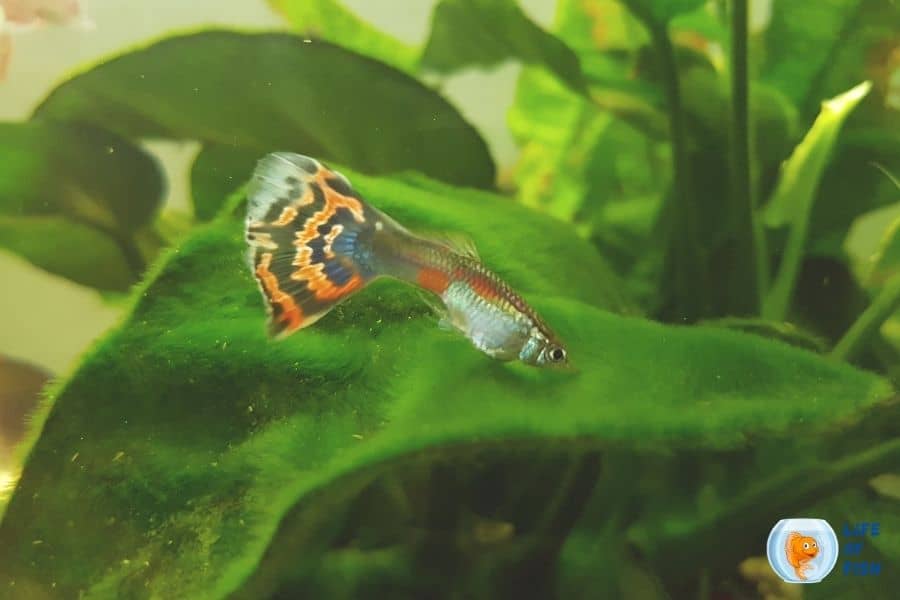
Yes, guppies like to be kept in a heavily planted environment. When doing so, make sure that you grow these in a way that they can swim around.
Also, a heavy plantation in the tank is ideal for guppies to breed since the fry can have many places hide within plants.
How long can guppies stay without food?
An adult guppy can stay without food for almost two weeks, whereas a guppy fry can only stay for around 2 to 3 days without food in a well maintained and well planted fish tank.
So here are a few things for you to follow if you want to go on a vacation or stay a few days away from home. First, you need to prepare your tank for the guppies to self-feed.
Here are some things you must do:
- Make sure you carry out filter maintenance a few days before leaving.
- The day before leaving, do a 50 to 70% water change.
- Make sure that no sick fish are in the tank.
If you own a tank filled with baby guppies and you need to go away for more than three days. You have to consider the below-mentioned point before leaving.
- Try fixing an automatic fish feeder that releases small amounts of food at a specifically given time frame.
Can I feed guppies vegetables?
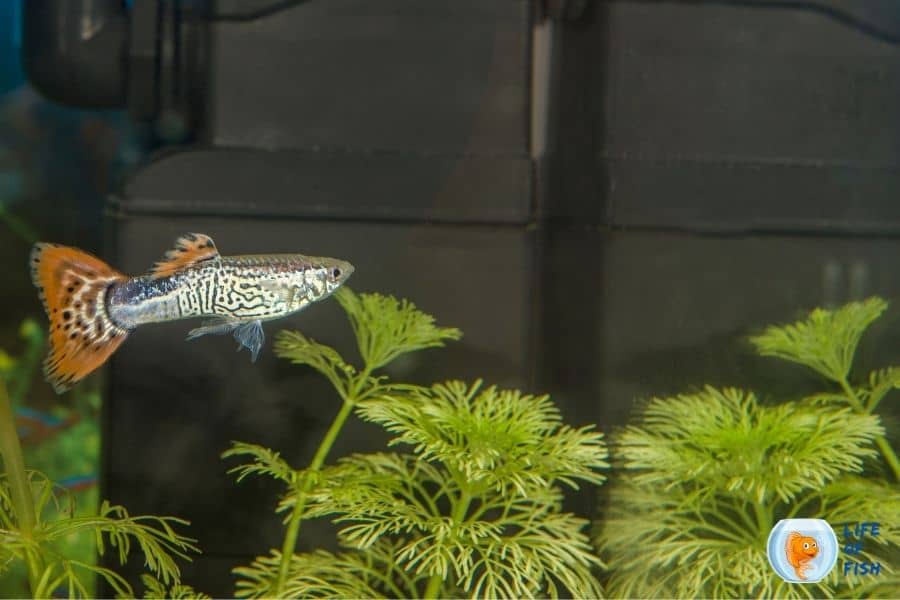
Yes, as we mentioned earlier, guppies’ love vegi matters, and it is essential to have some on their dieting plan. So here are a few vegetables that you could feed your guppies.
- Spinach
- Lettuce
- Zucchini
- Sweet Potatoes
- Carrots
- Pumpkin
Always remember vegetables like pumpkin can be eaten raw. And vegetables like Pea have to be boiled and peels removed before serving them.
Always remember when you feed vegetables to your guppies, you have to remove any uneaten vegetables from your tank after about 5 minutes.
Note that guppies will not smell these floating vegetables after 3 to 4 hours.
Can guppies eat bread?
Yes, you can feed your guppies with bread.
But it is advised not to do so. Bread contains many ingredients that might harm your guppy’s health.
What can you feed your guppies if you run out of food?
Many of the tank owners face this problem at least once. So what can I give my guppies if I ran out of their food? Well, the answer is you can always provide them with algae wafers or vegetables.
Related Questions
Do Guppies Like Plants?
Yes, Guppies like plants. Guppies are skittish and easily frightened. Plants are ideal for them to hide.
These fish usually prefer plants that are in the bottom of the tank more than the floating plants. Guppies sometimes eat bits of plants and mainly use them to hide their eggs.
Do Guppies Eat Duckweeds?
Yes, guppies do eat duckweed. You can feed your guppy duckweed by blending them with other food sources such as vegetables or raw shrimps.
Start by drying the blend first. Once it is dry, you can crush it into small bite-size flakes, which are perfect for the guppies.
Do Guppies Eat Plant Roots?
No guppies do not necessarily eat the plant root, but they might nibble the algae on the roots.
Can overfeeding guppies die?
Yes, if you overfeed your guppies, you might end up killing them. You might not think this as much of a big issue.
But overeating is one of the most common ways tropical fish die.
Conclusion
Guppies are active and often colorful, making them popular aquarium pets. Compared with other types of delicate tropical aquatic species, guppies are simple and easy to care for.
At the same time, as guppies are livebearers, these species are ideal for domestic breeding. In addition, guppies are one of the best tank cleanup crews since they eat basically anything edible and mainly feed on algae.
Guppies have an omnivorous diet, and their diets include a mix of meaty food and vegetable matter of soft algae and plant remains.
In an aquarium, guppies may feed on many sources of food products such as commercial fish food, live foods, freeze-dried and frozen food.
To maintain a healthy development, you must constantly feed your guppies with a multi-source food diet.
Read Next : Do Platies Eat Plants? | And Other Important Facts About Feeding Platy |
